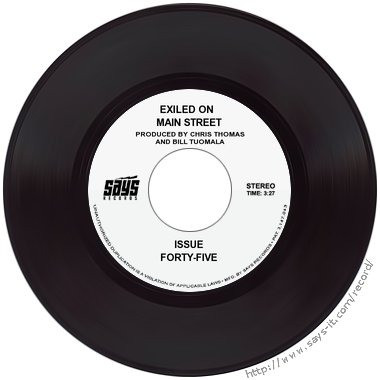Copy Link
Add to Bookmark
Report
Computer Undergroud Digest Vol. 09 Issue 29

Computer underground Digest Sun Apr 13, 1997 Volume 9 : Issue 29
ISSN 1004-042X
Editor: Jim Thomas (cudigest@sun.soci.niu.edu)
News Editor: Gordon Meyer (gmeyer@sun.soci.niu.edu)
Archivist: Brendan Kehoe
Shadow Master: Stanton McCandlish
Shadow-Archivists: Dan Carosone / Paul Southworth
Ralph Sims / Jyrki Kuoppala
Ian Dickinson
Field Agent Extraordinaire: David Smith
Cu Digest Homepage: http://www.soci.niu.edu/~cudigest
CONTENTS, #9.29 (Sun, Apr 13, 1997)
File 1--CYBERDAWG BARKING: Freedom...
File 2--"Child Safety on the Internet" by Distefano
File 3--SANS Network Security Digest (excerpts--Microsoft & Solaris)
File 4--WebSite & Backstage Internet Studio
File 5--Cokie Roberts on How Internet Is Ruining Rep Government
File 6--Responses to Cokie Roberts' column on the Net and government
File 7--Cu Digest Header Info (unchanged since 13 Dec, 1996)
CuD ADMINISTRATIVE, EDITORIAL, AND SUBSCRIPTION INFORMATION APPEARS IN
THE CONCLUDING FILE AT THE END OF EACH ISSUE.
---------------------------------------------------------------------
Date: Tue, 01 Apr 1997 07:38:54 -0600
From: Jon Lebkowsky <cdawg@austin.sig.net>
Subject: File 1--CYBERDAWG BARKING: Freedom...
CYBERDAWG BARKING:
Activism, Freedom, Apocalypso, and Zen
One thing I can say about CFP 97: No Big News. The
threat of censorship, the government's evident bad faith
re. First Amendment and privacy issues, its bogus crypto
policy and widespread cultural confusion about hot and
cold running information age...CFP reiterated these, the
usual complaints by the usual suspects, and focused
additionally on virtual commerce and virtual community,
but somehow forgot to address hot topics/potential threats
like the potential for the death of Usenet in the wake of a
successful Netpics prosecution, or the controversial
Internet filtering by an increasing number of public
libraries.
The conference was heavy with journalists and attorneys,
a few activists added for seasoning; the few hackers
present had become computer professionals with
corporate agendas, and nobody on or offstage seemed at
all whacky: it was sane, boring, and quiet. Though
Presidential aide Ira Magaziner did say the
administration would back off on the issue of censorship
if the CDA is defeated, but it's not clear he was speaking
for his boss, who at the time was being hauled off to the
hospital, his knee strained, perhaps by a confusion over
which direction to jerk.
For me the best part was after the conference: with old
friend & bohemian prankster Bruce Grobman I headed
for the hills, literally, to a verdant valley called Green
Gulch in Marin County, one point of presence for the San
Francisco Zen Center. We found the center silent but for
a slight wind and subtle rain...it was Saturday and a big
weekend sesshin (sitting quietly for hours on end)
buffered sound but for a few drifting conversations,
volunteers and visitors who weren't sitting, including
Bruce and I with our rants, scams, and revisitations.
We wandered the trail through the garden to Muir Beach
and talked about our lives, loves, and commitment to
family and friendship, and I was realizing that the best of
CFP was in the relationships I'd been forming over the
years, not so much working the hallways and the bars,
though there is that, but sitting wherever and sharing not
party lines and political agendas but personal visions,
hopes and fears, quirks and rants, between-the-lines, the
stuff of community.
And as I walked the beach, watching the crashing waves
and the snowy white birds as they skimmed the ether,
watching lovers embrace and children cavort and a group
of neon punks klutz through an ad hoc stream in the
sand, as I thought about my life, my wife and children
and grandchildren who are at various odd angles to this
virtual world I inhabit, I realized that this virtual world
we are building in cyberspace, with our passionate
commitment to freedom of information and open
communication, our growing sense of individual
empowerment and collective disavowal of violence, hate,
and oppression; is an infrastructure which, though it
exists in virtual space, is a foundation for evolutionary
optimism everywhere. That is, if we can survive the
`good intentions' of our leaders..
Fearing an unregulated free space, politicians portray the
Internet as a threat to our children, who will find
pornography online, they say, and recipes for building
bombs. The implication: we will lose control of our
world as children learn to Take Liberties.
***
So now it's Easter morning, and since I wrote the few
paragraphs above the Supremes have heard CDA
arguments (their questions at the time considered by
many a cause for optimism), the library filtering
controversy is still hotter than a bygod, recently we had a
full lunar eclipes on one side of the sky while Hale-Bopp
was cruising the other, and around the same time 39
bodies wearing pungent odor and clean shoes were found
at Rancho Santa Fe..
The media hypesters were ready for this cult suicide: they
couldn't quite make the Internet connection to Waco or
Timothy McVeigh or Richard Jewell, but there was a
clear link to Heaven's Gate: the cult members designed
web pages every day as their source of income, they
posted to usenet, they published their whacky Hale-Bopp
ideology at a web site which has become a kind of digital
archeological ruin for net.anthropologists to wade
through. So, finally, *clear indication* of Internet
danger: suicidal UFO cults live here, spreading their
dangerous memes far and wide, recruiting from among
the thousands of innocent children online. Never mind
that none of the cult members were children, never mind
that there's no evidence of successful online recruitment,
never mind that there were just 39 cult members, never
mind that they seemed happy as clams (ARS jammers
will catch, and hopefully pardon, the pun).they clearly
represent the danger posed by . . .
. . . FREEDOM. The Internet is free-flowing
information, and the "electronic frontier" metaphor was
prophetic of a time when "settlers" would move in and
seek regulation. However I never would've predicted the
current level of net hysteria, fed as it is by power-
grubbing politicians and security-grubbing status-quo
`average citizens' and `concerned parents.' I have
sympathy for the latter, those whose complicated
consumer-manic lives, already out of control, are
threatened by the many strange attractors operative in a
chaotic free space. But my sympathy doesn't extent to
legislation, and it doesn't extend to those who would use
average-joe fear and loathing as justification for a
legislated information anesthetic. No pain, no gain:
numbness is so much like death.
Months ago, before the CDA was attached to the
Telecommunications Act and around the time Mike
Godwin was slicing and dicing Marty Rimm's
disinformation report on Internet porn, I was writing a
piece, never finished, called "Bombs and Bondage." In it
I asked this question: if we could move all the supposedly
objectionable stuff (e.g. bomb recipes and bondage
photos) off the public spaces of the net, would the call for
net.regulation be dropped?
The answer is clear to me now, a resounding no: the calls
for regulation will come independent of any single,
particular issue. Freedom is never going to be easy, and
in fact it shouldn't be: consider that my freedom ends
where your freedom begins, and there are 250 million of
us in the U.S. alone, billions on the planet, so we should
expect sometimes tough negotiations. But we should
negotiate in the interest of the least restrictive,
understanding that unnecessary constraints on freedom,
especially in a complex cultural environment, imprison
the human spirit. During the cold war era our leaders
pointed to the stultifying effects of broad restriction and
oppression on the Soviet Union, China, and other
countries with totalitarian regimes. Are we now to adopt
broad restrictions of our own?
To be free is not to be totally unconstrained, but to be
without undue constraint. The trick is in determining
how much constraint is "due" vs. undue. Libertarians
talk about the desirability of noncoercive structures, e.g.
communities in which force is never necessary to compel
right action. I'm not completely sure how to create such
an environment, but it's a laudable goal. How much
"coercive" regulation results from fear rather than from
any real need to protect?
jonl 3/30/97
------------------------------
Date: Mon, 31 Mar 1997 14:11:49 EST
From: "Rob Slade, doting grandpa of Ryan & Trevor"
Subject: File 2--"Child Safety on the Internet" by Distefano
BKCHSFIN.RVW 961128
"Child Safety on the Internet", Vince Distefano, 1997, 0-13-569468-X,
U$34.95/C$48.93
%A Vince Distefano
%C One Lake St., Upper Saddle River, NJ 07458
%D 1997
%G 0-13-569468-X
%I Prentice Hall
%O U$34.95/C$48.93 +1-201-236-7139 fax: 201-236-7131 beth_hespe@prenhall.com
%P 296
%S Classroom Connect
%T "Child Safety on the Internet"
This volume contains a helpful and generally realistic set of
resources. It talks primarily about the dangers, but does note
that the risks are not as bad as some of the hype. The book does,
for once, look at other "dangers" besides pornography, and has a
reasonable chapter on netiquette. Online service protection
options, content rating systems, and protective/support groups are
discussed. In addition, there are suggestions and advice for
"after the fact" detecting and policing.
There are some gaps in the book. The fact that there are
weaknesses, inaccuracies and misleading statements in the (now
infamous) Rimm study/Time special is dismissed as "not important".
The subtle censorship of Internet filter software is not
discussed. (One of the filter programs on the accompanying CD-ROM
blocks non-pornography or violence related terms which are germane
only to discussions of certain political leanings. Filter
developers will not even confirm the dictionary of words used,
with some slight justification.) Most filter packages do not
allow parents to tune or manage the terms to be included or
excluded.
copyright Robert M. Slade, 1996 BKCHSFIN.RVW 961128
------------------------------
Date: Sun, 6 Apr 1997 01:55:50 -0500 (EST)
From: SANS'96 Conference Office <sans@clark.net>
Subject: File 3--SANS Network Security Digest (excerpts--Microsoft & Solaris)
((MODERATORS' NOTE: Here are a few excerpts from a new E-pub, "SANS
Network Security Digest." The first few issues have been crammed
with helpful news and notes for newbies and pros alike. It's free
until the end of April, but if recent issues are an indication of
what's to come, it will be worth paying for)).
Vol. 1, No. 3 |
March 20, 1997 |
Copyright, 1997. Please don't forward or copy without permission.
You'll find free subscription information after item 12.
Subscribe before 4/30/97.
-------------------------------------------------------
1) THREE PROBLEMS WITH MICROSOFT'S INTERNET EXPLORER
Problems have been reported recently relating to security in version
3.0x of Microsoft's Internet Explorer web browser. They raise
concerns about Explorer's vulnerability to remote execution of
programs - especially, but not exclusively, ActiveX programs. The
first reported bug is that IE will execute files appearing on web
pages with extensions of ".LNK" and ".URL". A good discussion of this
bug can be found at:
<http://www.cybersnot.com/iebug.html>
The second bug involves Version 3.0 users and the use of embedded
icons on web pages, that when selected will run the associated
program without warning. A discussion of this bug is available at:
<http://dec.dorm.umd.edu/index.htm>
The third bug, found in version 3.01A, allows IE to download and
execute ".isp" script files. This vulnerability is similar to the
first one regarding the ".LNK" and ".URL" files. A discussion of this
bug is available at:
<http://web.mit.edu/crioux/www/ie/index.html>
Microsoft has published patches and a FAQ regarding these
vulnerabilities. For more information, see:
<http://www.microsoft.com/ie/security/update.htm>
------------------------------------------------------------
2) SOLARIS 2.x PASSWD BUFFER OVERRUN VULNERABILITY
A buffer overflow has claimed another victim. A vulnerability has been
discovered in the passwd program under Solaris 2.3, 2.4 and 2.5. Under
2.5 the yppasswd and nispasswd program are hard links to passwd. The
vulnerability results from insufficient bounds checking on the input
arguments. The end result is that a malicious user could force the
passwd program to execute arbitrary commands.
Unfortunately no vendor patch available at this time. Members of the
AUSCERT team have written a wrapper program that can be used as a
workaround until a patch is available from Sun. The source for the
wrapper is available at:
<ftp://ftp.auscert.org.au/pub/auscert/tools/overflow_wrapper.c>
Precompiled binaries are available at:
<ftp://ftp.auscert.org.au/pub/auscert/tools/passwd_wrapper.tar.Z>
The AUSCERT Advisory, first posted on 2/26/97, is available on:
<ftp://ftp.auscert.org.au/pub/auscert/advisory/\
AA-97.09.Solaris.passwd.buffer.overrun.vul>
------------------------------------------------------------
8) THE NAUGHTYROBOT HOAX REPORT
Hoaxes continue to be a hot topic on the Internet. If you have
received an email message with a subject of "security breached by
NaughtyRobot", then you have experienced the NaughtyRobot Hoax first
hand. The mail headers of the NaughtyRobot message are forged so they
appear to originate from the local web server. According to CERT and
CIAC, so far there have been no indications of problems created by
these email messages. For more information, see the CIAC report at
<http://ciac.llnl.gov/ciac/CIACHoaxes.html#naughty>
----------------------------------------------------------
9) NEW MICROSOFT WORD VIRUS - SHAREFUN.A
McAfee has discovered a new Microsoft Word Macro Virus called
ShareFun.A. This Virus is unique. It is the first macro virus to
invoke MSMail to distribute itself. The macro virus will send
messages to three people in your address book, along with a copy of
the file that is infected.
McAfee is providing a current beta scan tool to detect and clean the
virus. More information can be found at:
<http://www.mcafee.com/support/techdocs/vinfo/v3333.html>
-----------------------------------------------------------
To subscribe, send email to sans@clark.net.
In the Subject--SANS Network Security Digest,
In the Body: name, title, organization, preferred email address, and, if
you also want an updated network security roadmap wall poster, your
surface mailing address.
After April 30, subscriptions are $80 per year. Send check to SANS
Network Security Digest, 4610 Tournay Road, Bethesda, MD 20816. The
Digest is copyrighted and may not be retransmitted or distributed or
copied without written permission.
------------------------------
Date: Wed, 12 Mar 1997 18:17:14 -0800
From: Ellen Elias <elias@ora.com>
To: cudigest@sun.soci.niu.edu
Subject: File 4--WebSite & Backstage Internet Studio
For Immediate Release
March 12, 1997
Further Information
Contact Ellen Elias
(707)829-0515 ext. 322
elias@ora.com
http://software.ora.com/
WEBSITE 1.1 INCLUDED WITH MACROMEDIA BACKSTAGE INTERNET STUDIO
O'Reilly's Technology Increases Database Capabilities for Web Sites
Sebastopol, CA--O'Reilly & Associates, a leading Internet software
developer and book publisher, announced today that its award-winning
WebSite 1.1(TM) software is included in Macromedia's Backstage Internet
Studio, which started shipping March 7. This combination provides
extensive database capabilities to commercial web sites, including
Internet, intranet, and extranet (business-to-business) sites.
O'Reilly's award-winning WebSite 1.1, heralded for its features, ease
of use and documentation, is included in Backstage(TM) Internet
Studio(TM) 2 for Windows 95 and NT. Backstage Internet Studio offers a
complete visual solution for developing database-driven web sites and
applications. The software eliminates the need for programming usually
required to develop such sophisticated Web-based applications as
customer service sites and electronic commerce solutions.
WebSite and Backstage Internet Studio complement each other with their
state-of-the-art tools, broadening the power of the webmaster while
providing products that save hours of time. "We haven't just added
O'Reilly's WebSite to the product, we've integrated it," said Steven
Shannon, senior product manager for Backstage at Macromedia. "Now,
Backstage is truly a complete Web site solution."
Kimberly Simoni, product manager for WebSite, added, "Macromedia is a
leading developer for the Web, multimedia and graphics, so it's a
natural partner for O'Reilly, one of the pioneers of the Internet."
O'Reilly's WebSite, winner of numerous awards including the Dvorak
Award for Outstanding Server Software and Windows NT Magazine Editor's
Choice, provides a full suite of web publishing and management
components. A powerful 32-bit server; WebView(TM), the intuitive and
graphical web management tool; WebIndex(TM) and WebFind(TM), which work
together to provide full-text search capability; MapThis(TM), a tool
for creating clickable image maps--these are just some of the tools
which comprise WebSite 1.1. Extensive technical information about
WebSite 1.1 and WebSite Professional, O'Reilly's high-security server,
is also available online (http://software.ora.com/).
Backstage Internet Studio is available in two editions, both of which
include WebSite 1.1. The Desktop Edition works with desktop-based
databases, including Microsoft Access, Excel, FoxPro, dBase and
Paradox, to create database-driven web sites for small offices or
workgroups within larger companies. The Enterprise Edition works with
client-server databases to handle large scale enterprise applications.
Both versions of Backstage Internet Studio include web page templates,
clip art, and Macromedia's xRes SE, a powerful hi-res image editor
optimized for developing and delivering web-based graphics.
Backstage Internet Studio 2's Desktop Edition, including WebSite 1.1,
has a suggested list price of $299 US, with an upgrade price of $99
available to registered owners of Backstage 1. The Enterprise edition
has a suggested list price of $999, with a $499 upgrade price.
ABOUT O'REILLY & ASSOCIATES
O'Reilly & Associates is recognized worldwide for its definitive books
on the Internet and UNIX, and for its development of online content and
software. O'Reilly developed the Global Network Navigator (GNN), a
pioneering web-based publication which it sold to America Online in
June, 1995. In addition to WebSite 1.1, O'Reilly's software products
include WebSite Professional, the second generation server product for
Windows 95 and Windows NT; WebBoard, a Web-based multi-threaded
conferencing system; PolyForm, a web authoring tool for forms, and
Statisphere, a graphical web traffic analyzer (to be released Spring,
1997).
WebSite Professional, WebSite, WebBoard, PolyForm, and Statisphere are
trademarks of O'Reilly & Associates, Inc. All other names are
registered trademarks or trademarks of their respective companies.
------------------------------
Date: Fri, 11 Apr 1997 15:03:24 -0700 (PDT)
From: baby-X <baby-x@slowdog.com>
Subject: File 5--Cokie Roberts on How Internet Is Ruining Rep Government
Source - Fight-Censorship <fight-censorship@vorlon.mit.edu>
I always thought Cokie Roberts was a dolt anyway; now I only have further
proof.
---------- Forwarded message ----------
From--James Love <love@tap.org>
Date--Fri, 11 Apr 1997 17:48:27 -0400 (EDT)
This is a real syndicated column by Cokie Roberts. It is not a spoof.
Cokie interviewed me about how the Internet is changing the relationship
between citizens and government agencies, after she read about the FTC's
decision to take email comments on the Staples merger. She then wrote
this astonishing column with her husband, Steven Roberts. At the end of
Cokie's column is a letter to the editor sent by Susan Ashdown, a reader
of the Salt Lake Tribune, which is one of newspapers which ran the column.
Since Susan brought this to my attention, I am including her letter.
Cokie and Steven Roberts column, and Susan's letter to the editor, are
redistributed with permission. Jamie Love (love@tap.org, 202.387.8030
http://www.cptech.org
Salt Lake Tribune, April 5, 1997, Page A-11
Internet Could Become a Threat To Representative Government
Cokie Roberts and Steven Roberts
United Features
Cyber seduction, cult by computer, kids caught in an indecent web! The
headlines have been scary of late as we learn more about the dangers of
the brave new world of the Internet.
To be sure, the experts keep assuring us that the World Wide Web does more
good than harm-that it can help young people find facts, police officers
hunt down clues, and citizens communicate with their government.
"If you're on-line, you're inside the Beltway," in the opinion of Graeme
Browning, author of the book Electronic Democracy, which argues that the
Internet is making individuals more politically powerful. Sounds good,
but is it?
For many parents, the idea of yet another influence in their children's
lives over which they have no control is threatening. The horrible
thought that, in the privacy of your own home, your child could be the
target of some sick predator was frightening enough. Now, since reading
the news recently, the fear of recruitment to some kooky cult must be
added to the list of computer concerns.
Responding to those worries, Congress passed the Computer Decency Act,
aimed at blocking pornography on the Internet. The law was immediately
challenged as an unconstitutional abridgement of free speech, and last
month the Supreme Court heard oral arguments on the case. In their
questions the justices revealed the same wide-eyed wonder we feel when
hearing about the latest form of communication. What is this thing
anyway? How does it work and what can it do?
One thing it clearly can do is bring citizens more into the
decision-making processes of government. That came home to us recently
when we heard that the Federal Trade Commission was accepting electronic
mail on the question of whether Office Depot stores should be allowed to
merge with Staples. The FTC has so far received thousands of comments and
a spokeswoman says that, although the merger decision won't be based on
what the agency hears from the public, she thinks the e-mail is a good
idea. The FTC decided to do it, she admitted, because of pressure from
the Consumer Project on Technology.
"The Internet is the best thing in my lifetime for grassroots organizing,"
exults the Project's director, Jamie Love. He's managed to use the system
to influence various government agencies, and to educate the public. Love
argues that this type of organization and communication cuts through the
special interest politics that he believes rules Washington. "I think
there's a general sense that people who can hire a guy and game the system
have a leg up," says Love.
Somewhere between 250,000 to 350,000 people check into the site dealing
with congressional activities every day. And then many of these people
get in touch with their representatives, by e-mail, of course.
They also get in touch with each other on public policy issues. According
to Love, it's like an electronic town meeting. That analogy makes our
blood run cold. Remember, that was Ross Perot's big idea. Let's just all
get together, via computer, and let the politicians know what we want, so
then they will do it! No more pandering to the big contributors, no more
deals between members, just the voice of the people will be heard!
We hear that and shudder. To us it sounds like no more deliberation, no
more consideration of an issue over a long period of time, no more
balancing of regional and ethnic interests, no more protection of minority
views.
The Founders were clear in their advocacy of representative democracy as
opposed to direct democracy. In The Federalist, James Madison asserted
that "the public voice pronounced by the representatives of the people
will be more consonant to the public good than if announced by the people
themselves convened for that purpose."
But representative government is under attack. "We've been electing
people for years and never been in worse shape and felt more
disconnected," says Barbara Vincent of the National Referendum Movement.
Her organization wants to put initiatives and referenda on the ballots of
every state so that the people can decide "the really important issues"
while Congress can handle "everyday affairs." And Ms. Vincent has public
opinion on her side. In a bipartisan poll, fully three-quarters of the
people said they favored putting national issues on ballots across the
country.
Computers could make that possible. And, if we're not careful, they
might. Jamie Love is right that people think the game is fixed, and
Barbara Vincent is right that the voters feel disconnected. The best
thing the lawmakers can do to fix that is to call a halt to the money
chase, to show constituents that they count. If that doesn't happen,
congress could eventually find its very existence threatened, thanks to
the Internet. And that would make the current debate over pornography
seem like small potatoes.
-------------------
Date: Fri, 11 Apr 1997 14:31:21 -0600
From: Sue Ashdown <zero@xmission.com>
To the Editors of the Salt Lake Tribune & United Features:
Now I've heard everything. The Internet is nothing but a
cyber-sewer, full of smut, cults, and now an even greater danger: easy
access to government officials. Cokie Roberts and her husband say their
"blood runs cold" at the idea of citizens emailing their opinions directly
to the Federal Government instead of channeling them through their
"representatives". They argue that it would mean the end of reasoned
consideration of a variety of views, and worse, it might bring us closer
to direct instead of representative democracy - not what the Founding
Fathers intended. (The Founders weren't too keen on emancipation either,
but never mind.)
Talk about the end of reason. I fail to see how the direct
expression of public opinion logically leads to the destruction of careful
deliberation. Perot wasn't my choice for President, but the mere fact
that "electronic town meetings" were his "big idea" does not automatically
make them meritless.
Personally my blood runs cold when I think of the representative
democracy Cokie has in mind. Her brother, Tommy Boggs, of the Washington
law firm Patton, Boggs & Blow made quite a name for himself as a lobbyist
arguing strenuously on behalf of erstwhile Guatemalan dictators and death
squad financiers in the 1980's and early 1990's. If as the Roberts claim,
a halt to the money chase is a far better solution to voter discontent
than the airing of public opinion through the Internet, then presumably
this means that Tommy's firm will find better uses for its generous cash
donations to candidates across the political spectrum. I can understand
Cokie standing up for her brother's interests - I'd do the same for mine,
who's done reasonably well as an Internet Service Provider, but at least
I'd reveal my motives.
Sincerely,
Sue Ashdown
Salt Lake City, Utah
------------------------------
Date: Sun, 13 Apr 1997 12:50:29 -0700 (PDT)
From: Declan McCullagh <declan@well.com>
Subject: File 6--Responses to Cokie Roberts' column on the Net and government
Source - fight-censorship@vorlon.mit.edu
[Hayek has it right -- we shouldn't fetishize democracy. Democracy is at
best a means to a freer society, not a guarantee of one. Under the weight
of a homogenous majority, a democracy can be more oppressive than a benign
dictatorship. Instead, we should pursue liberty as a goal. -Declan]
*******************
Date--Fri, 11 Apr 97 20:08:00 DST
From--"Halpert, James - DC" <jhalpert@pipermar.com>
This column is remarkably unfair -- at its core an elaborate bait and
switch. Petitioning the government over the Net has nothing to do with
cyber-stalking or cyberporn -- and is a considerable leap away from
electronic town hall referenda.
Whatever the merits of instant electronic referenda, giving the public an
opportunity to comment on federal agency decisions is what agency
rulemaking is supposed to be all about -- only until recently, such
organizing efforts have required significant resources. The Net has
helped to change that.
The logical extension of the Roberts' position is to call for
congressional offices to disconnect their telephones so that mass call-in
campaigns by the Christian Coalition, AARP and other well-funded, highly
disciplined grassroots groups are not heard. Are these troops more
reflective than Net users. Hardly (remember the CDA juggernaut).
But the Roberts wouldn't dream of closing the doors of power to that sort
of campaign. They attack the Net because it is new, scary to them and
some of their readers, and therefore an easier target.
-- Jim Halpert
*******************
Date--Sat, 12 Apr 1997 01:47:03 -0400
From--Theodore Baar <tedbar@omegacom.com>
To--"'declan@well.com'" <declan@well.com>
Declan - regardings Roberts whining diatribe.......
I have an interesting point you might consider. The philosophical keystone
of the Protestant Reformation rested on the concept that man deals
directly with God and did not require a priest to stand between or mediate
for him.
Likewise we now have an alledgedly "representative" government that, at
least according to Ms. Roberts, stands between us and governance to
protect us from ourselves and teach us our "place". No doubt she includes
herself in this "protector" class as a jo urnalist to help we poor
peasants "understand" our appropriate relationship to governance.
I suggest she brush up on democracy real soon or start reading books on
Oliver Cromwell. Her points on the dangers of direct democracy are of
course true with one small caveat, direct involvment is the last hope we
have because their is no representative government.
I have no representation in Washington. For 30 adult years I've watched
the democratic led permanent government, including their journalistic
water carriers, represent everyone but the people who really make this
country work. Government by special inetre st and whining is not
representative government, don't kid yourself.
Now the, so to speak, first representative is Bill Clinton. I am quite
certain he represents the the embodiment of the permanent government and
every belief Cokie & her ilk hold privately dear, otherwise why would the
press be so supportive. Based on that
I dare say that representative government has failed miserably.
If representative government is foiled by nonsense like the last two years
of democratic party nonsense and direct government is then blocked (all in
our best interests of course) it will then mark the end of our democracy.
The remaining moderates (check out the blue dog democrats and Ben Campbell
of Colorado) will be forced to extremes to seek redress, thus my reference
to Cromwell.
What Ms. Roberts, like so many, does not understand is that Gingrich and
his people are not the rabid attack dogs of facism they alledge but in
fact the last reasonable men. If things get ugly I suspect none of us will
like who leads the next wave.
Ted Baar
-----------------------------------------------------------------
http://www.omegacom.com
Omegacom, Inc. Providence, RI 02906
Boston, Providence (RI), Saco (ME) and St. Croix (USVI)
-----------------------------------------------------------------
******************
Date--Sat, 12 Apr 1997 10:18:25 -0700 (PDT)
From--Anthony Jankowski <anjank@iquest.net>
To--declan@well.com
thanks for sharing the Cokie and Mr. Cokie column! the whole thing is
laughable, and I'm sending a note to her via All Things Considered...
Cokie and her ilk, i.e. the other talking head pundits, are deathly afraid
of the Net, NOT because it's "anti" democratic, but for the very reason that
IT IS DEMOCRATIC AND MUCH MORE REPRESENTATIVE than those that allegedly
represent us!
I don't know what Internet she's using, but from my travels, I've seen
everyone represented on the Net quite well, straight, queer, liberal, con-
servative, radical, anarchist, skin-heads, nazi-lovers, black, white, rich,
poor, etc.. the Forum is wide open, the very opposite of what goes on in
the "halls of Congress".
Her and hubby open the column with the standard scare tactic that phoney-
baloney moralists use-- the "kids get porn on the Net" ploy... their
implication that "parents have no control over what their kids are seeing" is
a flat out LIE. there are now dozens of software packages available to
parents that want to screen what their kids are seeing.
but then they move right into their real concern--- politics, and their
ability to make money off of politics. They wax eloquently about what the
Founding Fathers wanted in terms of representative government. Please, let's
get REAL, here! Did the Founders advocate career politicians? Did the Founders
advocate a system where large corporations make campaign contributions, and
get tax breaks, tax subsidies (corporate welfare) from the government in
return? While the Roberts' comment on stopping the "money chase", we ALL
KNOW very well
that is NOT going to happen under the status quo!
The People have spoken. As author and film maker Michael Moore (Downsize This)
pointed out, "less than 50% of the eligible voters voting is an act of civil
disobediance!" The People NO LONGER BELIEVE IN THE SYSTEM for good reason.
The average person's needs are NOT being met by the current system, and under
the Constitution it is our complete right to creat a new system, in fact, it is
our civic duty to do so.
Now we have a tool at hand which allows for every voice to be heard, the Net.
Computers and the Internet were not even conceivable to the Founding Fathers,
so naturally it made more sense to advocate a "representative" speaking
collectively for the People. But given the proven capabilities of the Net,
would they still feel that way, or would they conceive a different system?
I agree totally with Ms. Vincent. Important issues should, MUST be put on
national referendums. ONLY THEN will everyone have their input taken seriously.
The silly notion that "all we have to do is fix the current system and all
will be well" is just that: SILLY and laughable. The problems we have now
have been building for the last 100 years! Our elected representatives (some
of them in office for almost that long) have had every oppportunity to fix
the system, and show that it is democratic. THEY HAVE MISERABLY FAILED!!!!!
It's time for the corruption to END, plain and simple. The People are
finally wising up, and the Net can be thanked for that. Ms. Roberts' will soon
be out of a job, and that's what really concerns her... with many more Voices
available on the Net, we no longer need the likes of Ms. Roberts, with her
self-serving agenda. Like the dinosaurs, there kind is about to become extinct.
A centralized, representative system will always be corruptible by monied
interests. However, a de-centralized system, with only 85% participation, using
the Net as a vote-collecting tool, would totally shift the power back to where
it needs to be: The Average Citizen. The lobbyists cannot BRIBE US ALL-- it
wouldn't be "cost effective".
Anthony Jankowski
"A conservative government is a hypocrisy." Benjamin Disraeli, former Prime
Minister of England... will the U.S. ever have a Jewish president? a woman?
a Black? an Oriental?
Sudden Impact Graphics
http://www.geocities.com/CapitolHill/6645
"Who cares for the Heart?" Shri P. Rajagoplachari
------------------------------
Date: Thu, 15 Dec 1996 22:51:01 CST
From: CuD Moderators <cudigest@sun.soci.niu.edu>
Subject: File 7--Cu Digest Header Info (unchanged since 13 Dec, 1996)
Cu-Digest is a weekly electronic journal/newsletter. Subscriptions are
available at no cost electronically.
CuD is available as a Usenet newsgroup: comp.society.cu-digest
Or, to subscribe, send post with this in the "Subject:: line:
SUBSCRIBE CU-DIGEST
Send the message to: cu-digest-request@weber.ucsd.edu
DO NOT SEND SUBSCRIPTIONS TO THE MODERATORS.
The editors may be contacted by voice (815-753-0303), fax (815-753-6302)
or U.S. mail at: Jim Thomas, Department of Sociology, NIU, DeKalb, IL
60115, USA.
To UNSUB, send a one-line message: UNSUB CU-DIGEST
Send it to CU-DIGEST-REQUEST@WEBER.UCSD.EDU
(NOTE: The address you unsub must correspond to your From: line)
Issues of CuD can also be found in the Usenet comp.society.cu-digest
news group; on CompuServe in DL0 and DL4 of the IBMBBS SIG, DL1 of
LAWSIG, and DL1 of TELECOM; on GEnie in the PF*NPC RT
libraries and in the VIRUS/SECURITY library; from America Online in
the PC Telecom forum under "computing newsletters;"
On Delphi in the General Discussion database of the Internet SIG;
on RIPCO BBS (312) 528-5020 (and via Ripco on internet);
and on Rune Stone BBS (IIRGWHQ) (860)-585-9638.
CuD is also available via Fidonet File Request from
1:11/70; unlisted nodes and points welcome.
In ITALY: ZERO! BBS: +39-11-6507540
In LUXEMBOURG: ComNet BBS: +352-466893
UNITED STATES: ftp.etext.org (206.252.8.100) in /pub/CuD/CuD
Web-accessible from: http://www.etext.org/CuD/CuD/
ftp.eff.org (192.88.144.4) in /pub/Publications/CuD/
aql.gatech.edu (128.61.10.53) in /pub/eff/cud/
world.std.com in /src/wuarchive/doc/EFF/Publications/CuD/
wuarchive.wustl.edu in /doc/EFF/Publications/CuD/
EUROPE: nic.funet.fi in pub/doc/CuD/CuD/ (Finland)
ftp.warwick.ac.uk in pub/cud/ (United Kingdom)
The most recent issues of CuD can be obtained from the
Cu Digest WWW site at:
URL: http://www.soci.niu.edu/~cudigest/
COMPUTER UNDERGROUND DIGEST is an open forum dedicated to sharing
information among computerists and to the presentation and debate of
diverse views. CuD material may be reprinted for non-profit as long
as the source is cited. Authors hold a presumptive copyright, and
they should be contacted for reprint permission. It is assumed that
non-personal mail to the moderators may be reprinted unless otherwise
specified. Readers are encouraged to submit reasoned articles
relating to computer culture and communication. Articles are
preferred to short responses. Please avoid quoting previous posts
unless absolutely necessary.
DISCLAIMER: The views represented herein do not necessarily represent
the views of the moderators. Digest contributors assume all
responsibility for ensuring that articles submitted do not
violate copyright protections.
------------------------------
End of Computer Underground Digest #9.29
************************************

















